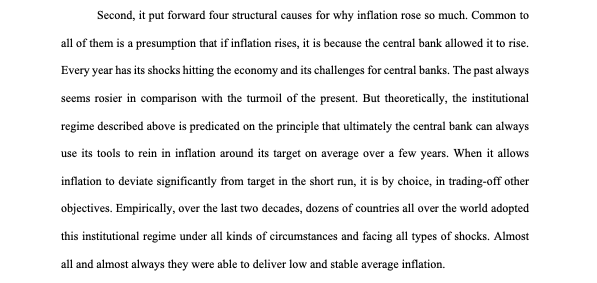
** Is it my fault that my head is wet? 🌧️
A strong recovery, fiscal stimulus, supply bottlenecks, Russia's invasion, energy crisis. Surely they are the causes for why inflation is high? Therefore, it is not the central banks’ fault!
Yes but no 🧵
A strong recovery, fiscal stimulus, supply bottlenecks, Russia's invasion, energy crisis. Surely they are the causes for why inflation is high? Therefore, it is not the central banks’ fault!
Yes but no 🧵
https://twitter.com/R2Rsquared/status/1553410950157459461
If it suddenly starts raining, and my head gets soaking wet, it was the rain that caused it. Not my fault?
Well, it turns out I had an umbrella ☔️. I chose not to open it. Even if I did it for good reasons, and even if the umbrella wasn't perfect, it is my fault I got so wet.
Well, it turns out I had an umbrella ☔️. I chose not to open it. Even if I did it for good reasons, and even if the umbrella wasn't perfect, it is my fault I got so wet.
Lots of shocks hit the economy all the time. Inflation targeting is all about using monetary policy to offset them. That is imperfect, so even the best/luckiest CBs will end up with 1-3%, or argue 5% one-off is best. But 7-9% for more than a year is (almost always) their fault. 

The regime of CB independence rests on principle that monetary policy can hit the inflation target. Lots of debate in academia on whether (or when) this is right; maybe success of last 25 years was a fluke. But for central bankers this is a raison d'être
personal.lse.ac.uk/reisr/papers/9…
personal.lse.ac.uk/reisr/papers/9…

I made this umbrella analogy in this fun podcast discussion with @zingales and @bethanymac12 at #Capitalisnt in the @StiglerCenter. Thank you for having me.
https://twitter.com/StiglerCenter/status/1550137691433484289?s=20&t=h3viRHo8TD3puOc3BPHDAw
PS: There are huge, and very intellectually rewarding, literatures on causality, counterfactuals, and the role of policy, spanning philosophy, statistics, and economics (and more). I would not know where to start with a recommendation, but others here might.
• • •
Missing some Tweet in this thread? You can try to
force a refresh





